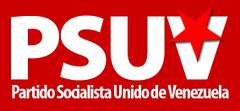Difference between revisions of "United Socialist Party of Venezuela"
(Importing from WP and expanding) |
(Added: headquarters, founders.) |
||
| Line 4: | Line 4: | ||
|image_width=240px | |image_width=240px | ||
|wikipedia=https://en.wikipedia.org/wiki/United_Socialist_Party_of_Venezuela | |wikipedia=https://en.wikipedia.org/wiki/United_Socialist_Party_of_Venezuela | ||
| + | |headquarters=Mariperez, Caracas | ||
| + | |founders=Hugo Chávez | ||
}} | }} | ||
The '''United Socialist Party of Venezuela''' (Partido Socialista Unido de Venezuela, '''PSUV''') is a socialist political party in [[Venezuela]] which resulted from the fusion of some of the political and social forces that support the [[Bolivarian Revolution]] led by the late President [[Hugo Chávez]] who died in 2013. The PSUV had approximately 7.6 million members by 2014 when [[Nicolás Maduro]] had succeeded Chávez as President.<ref>Bloomberg, 11 October 2007, ''[https://www.bloomberg.com/apps/news?pid=newsarchive&sid=aqg5jOxmM.Vg "Venezuela May Lower Voting Age, Add Gay Rights in Constitution"]''</ref> PSUV held primary elections on 2 May 2010 for candidates to the National Assembly election in September 2010, with 2,568,090 members voting.<ref>''[https://web.archive.org/web/20100505154454/http://www.abn.info.ve/noticia.php?articulo=232445&lee=1 Cifras de primarias del PSUV superan en 29% consulta interna de la derecha venezolana"]''</ref> | The '''United Socialist Party of Venezuela''' (Partido Socialista Unido de Venezuela, '''PSUV''') is a socialist political party in [[Venezuela]] which resulted from the fusion of some of the political and social forces that support the [[Bolivarian Revolution]] led by the late President [[Hugo Chávez]] who died in 2013. The PSUV had approximately 7.6 million members by 2014 when [[Nicolás Maduro]] had succeeded Chávez as President.<ref>Bloomberg, 11 October 2007, ''[https://www.bloomberg.com/apps/news?pid=newsarchive&sid=aqg5jOxmM.Vg "Venezuela May Lower Voting Age, Add Gay Rights in Constitution"]''</ref> PSUV held primary elections on 2 May 2010 for candidates to the National Assembly election in September 2010, with 2,568,090 members voting.<ref>''[https://web.archive.org/web/20100505154454/http://www.abn.info.ve/noticia.php?articulo=232445&lee=1 Cifras de primarias del PSUV superan en 29% consulta interna de la derecha venezolana"]''</ref> | ||
Revision as of 17:53, 8 August 2017
 | |
| Founder | |
| Headquarters | Mariperez, Caracas |
The United Socialist Party of Venezuela (Partido Socialista Unido de Venezuela, PSUV) is a socialist political party in Venezuela which resulted from the fusion of some of the political and social forces that support the Bolivarian Revolution led by the late President Hugo Chávez who died in 2013. The PSUV had approximately 7.6 million members by 2014 when Nicolás Maduro had succeeded Chávez as President.[1] PSUV held primary elections on 2 May 2010 for candidates to the National Assembly election in September 2010, with 2,568,090 members voting.[2]
At the 2015 parliamentary election, PSUV lost its majority in the National Assembly for the first time since the unicameral legislature's creation in 2000 against the Democratic Unity Roundtable, gaining 55 out of the National Assembly's 167 seats.[3]
In the 30 July 2017 National Constitutional Assembly elections, Venezuela's National Electoral Council announced that more than eight million people had voted to grant President Maduro's ruling PSUV virtually unlimited powers with 545 NCA members elected.[4] The opposition disputed that 8.1 million (41.5%) had cast their votes.[5]
References
- ↑ Bloomberg, 11 October 2007, "Venezuela May Lower Voting Age, Add Gay Rights in Constitution"
- ↑ Cifras de primarias del PSUV superan en 29% consulta interna de la derecha venezolana"
- ↑
{{URL|example.com|optional display text}} - ↑ "Maduro hails Constituent Assembly election victory"
- ↑ "Exclusive: Venezuelan vote data casts doubt on turnout at Sunday poll"
Wikipedia is not affiliated with Wikispooks. Original page source here